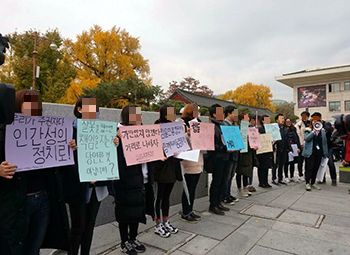
On Nov. 9, at Sogang University, President Park Geun-hye’s alma mater, students gathered to submit their petition to withdraw Park’s honorary Political Science doctorate.
In their press conference, 24 undergraduate and graduate student councils from various departments submited a petition to urge the school to revoke her honorary Political Science doctorate.
Students accused President Park of having violated the nation’s constitutional law, threatening the fundamentals of democracy. In their joint statement, students concluded that President Park’s honorary degree should be revoked due to the allegations surrounding her political misconduct in relation to Choi Soon-sil.
“Legislative or systemic reform is of no use if we do not abide by the rules,” stated President Park in her speech accepting the honorary doctorate back in 2010, in celebration of the 50th anniversary of Sogang University. “The importance lies not in the system but in our actions, and how we gain the trust of the people.”
In response to that speech, the student representative of Sogang University Graduate School stated that the students’ trust in the President has collapsed. Students also cited article 42 of the Sogang University Graduate School regulations, which specified that the university president may revoke a degree due to dishonorable conduct. The school, still processing the petition, has offered no response other than that there has never before been a case in which an honorary doctorate was revoked.
In Daejeon, students of Korea Advanced Institute of Science and Technology (KAIST) also clamored for revoking President Park’s honorary doctorate.
On Nov. 3, an estimated 150 students assembled for a convention to revoke President Park’s doctorate, and spent the night speaking publically of their disapproval and opposition towards the Park administration. They also put on a skit in which students wearing masks of President Park acted out the President being stripped of her honorary doctorate.
Universities are also reviving class boycotts, last organized in Korea eight years ago during the 2008 U.S. beef protests. Participating students from across the nation, including Sogang, Hanyang, Sungkyunkwan, Sungkonghoe University and more, took to the streets instead of the classrooms, where they placed cards on their desks that read “Boycotting classes on Nov. 11 for the resignation of the Park administration.”
The class boycott was first suggested by student activists from the university student organization Saramdeul: Network for Human Rights. On Nov. 10, representatives of the Saramdeul: Network for Human Rights and about 20 university students came together at Sungkyunkwan University to announce their two-day boycott, from Nov. 10 to 11.
During the boycott, some professors like Professor Jeong Yeon-bo at Sungkonghoe University supported the students and encouraged more students to join, either by cancelling their classes or not taking attendance during the two days.
“The movements towards social change is closely related to what we learn in class,” said Professor Jeong at Deparment of Social Sciences. “Therefore, I didn’t call attendance that day so students would be free to participate in the boycotts, as I saw it as a learning experience in the form of a field study.”
According to Sungkonghoe University student press, student participation far surpassed the anticipated 30 people, thanks to the support and attention.
Representatives of the student activists for the university class boycott believe this boycott’s significant lies in the efforts of the students to take actual action and voice themselves out in public.
“Class boycotting is the most active measure of opposition that we can take as students,” one participant said. “We are taking actions against the current issues out to the streets.”
The opposition movement continued as the People’s Network for Human Rights held another class boycott on Nov. 24.

